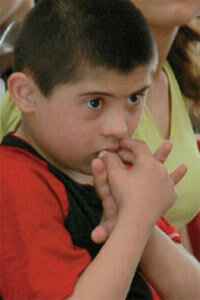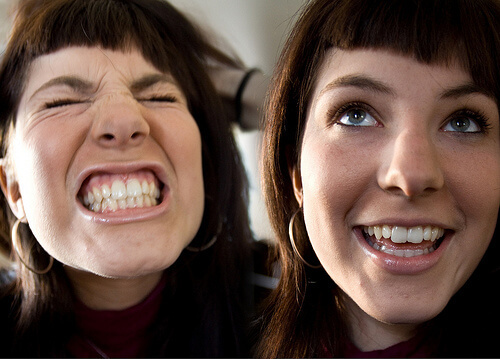Causes of dementia in humans
 Any elderly person can face such a disease as dementia. This disease does not give rest and to the person, and its relatives. The causes of dementia can be different, some of them can trigger the development of the disease and at a young age.
Any elderly person can face such a disease as dementia. This disease does not give rest and to the person, and its relatives. The causes of dementia can be different, some of them can trigger the development of the disease and at a young age.
What is dementia?
Dementia is a decrease in the functions of memory and other mental abilities( cognitive functions).This disorder ultimately reduces a person's ability to engage in everyday activities such as the ability to eat, get dressed, wash. Dementia is most common in the elderly. Dementia is not a normal part of the aging process, since the disease is caused by a number of health disorders that can occur in the elderly and at a young age. Dementia worsens over time. It affects about 1 percent of people between the ages of 55 to 60, and about 30-50 percent of people older than 70-80 years. This is the most common reason why elderly people are placed in a nursing home.
With dementia, people remain conscious, but lose long-term and short-term memory. The mental capacity of people with dementia is reduced in everything, including the use of their native language;Understanding of what is happening around them;The ability to reason, solve problems, think abstractly. These losses not only worsen a person's ability to function independently, but also have a negative impact on the quality of life and relationships with relatives. Many elderly people are afraid that they develop dementia due to the fact that they can not find their glasses, or can not long remember someone's name. It is these problems that develop because of the slowed-down mental processes with age, this condition is less severe than dementia.
Causes of dementia in humans.
Dementia has many different causes, some of which are difficult to distinguish from each other. Many diseases can lead to symptoms of dementia, especially in the elderly.
- The causes of dementia include various diseases and infections, strokes, craniocerebral trauma, drug use, nutritional deficiencies.
- Dementia reflects dysfunction in the cerebral cortex or brain tissue. Some diseases damage the cerebral cortex, others - subcortical areas.
- Dementia can be cured if the underlying function of the brain is not damaged.
In medicine, dementia is divided into reversible and irreversible dementia.
Irreversible dementia.
The main causes of irreversible dementia in people are damage to brain cells, cortical and subcortical areas. Treatment focuses on slowing the progress of the disease and alleviating the symptoms.
Alzheimer's disease .This is the most common cause of dementia. This disease disrupts the deposition of protein in the brain, cells are destroyed, as a result of which the functions of memory and psyche are broken. Alzheimer's disease is an irreversible disease, and so far no known treatment exists. However, some drugs can slow the progress of Alzheimer's disease.
Vascular dementia of the .This is the second most common cause of dementia. It accounts for about 40 percent of cases. Vascular dementia is caused by atherosclerosis. Fats, dead cells and other in the nutria of the arteries partially or completely block the blood flow. This obstruction is a common cause of strokes or interruption of blood flow to the brain. These obstacles also provoke myocardial infarction. Vascular dementia is sometimes called multidembrance. Vascular dementia is associated with high blood pressure, high cholesterol, heart disease, diabetes and related conditions. Treatment of these conditions can slow the development of vascular dementia, but if the functions are lost, they do not return.
Parkinson's disease .People with this disease usually have problems with limbs, speech and tremor( shaking at rest).Dementia may develop during the course of the illness, but not in all people with Parkinson's disease dementia. Most likely will be affected by memory, speech, the ability to reason.
Dementia with Levi bodies .This is due to abnormal microscopic deposition of proteins called Lewy bodies, which destroy nerve cells. These deposits can cause symptoms typical of Parkinson's disease symptoms, such as tremor, muscle stiffness, and also dementia, like Alzheimer's. Dementia with Levi bodies affects thinking, attention and concentration more than language and memory. Like Alzheimer's, dementia with Levy bodies is not reversible, and has no known cure. Drugs for the treatment of Alzheimer's disease can benefit people with dementia.
Huntington's disease .This is a hereditary disease, the cause is the loss of certain brain cells that control movement and thinking. Dementia often occurs in the late stages of the disease. The disease also affects memory, speech, the ability to reason.
Creutzfelt-Jakob disease .This is a rare disease. It occurs in young people and in middle-aged people. Infectious cells, called prions, invade and kill brain cells. This leads to a change in habits and loss of memory. The disease progresses rapidly and leads to death.
Frontal temporal dementia. This is another rare disease that damages cells in the front of the brain. A change in the behavior of a person usually precedes a loss of memory and problems with the language.



